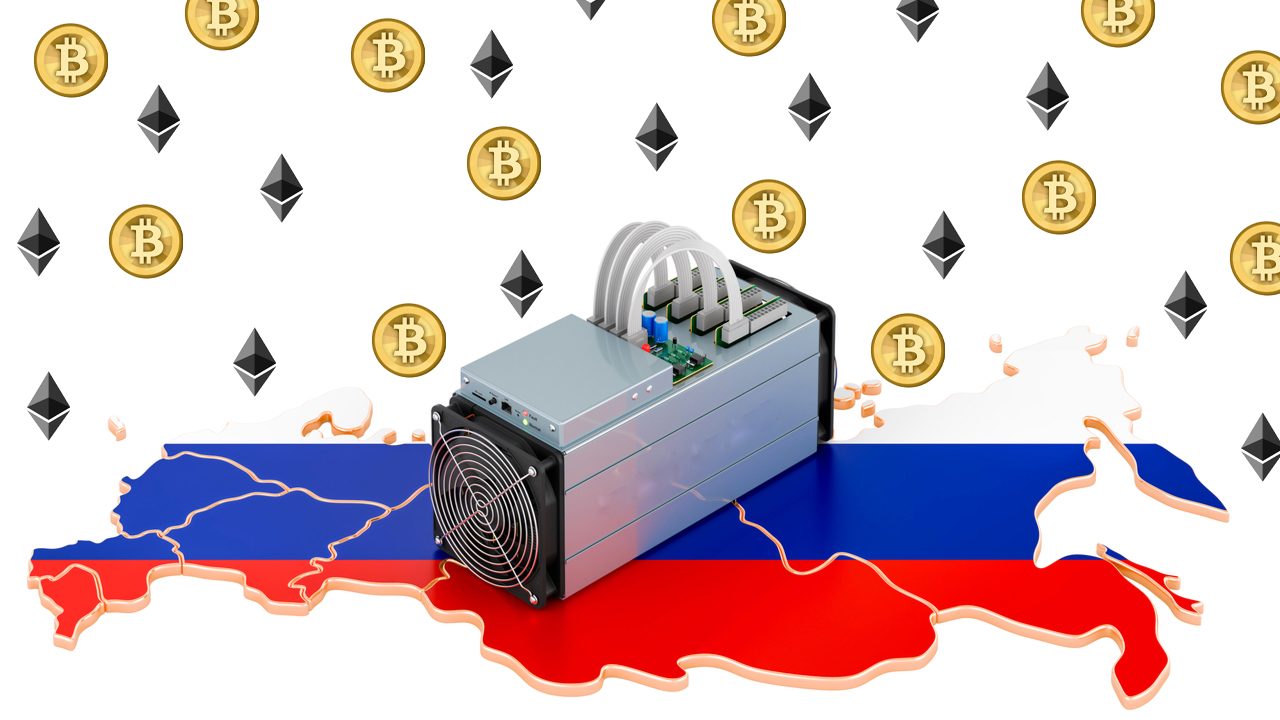Russian Bitcoin Mining Assessed Amid Conflict With Ukraine, Large ETH Pool Cancels Service to Russia – Mining Bitcoin News

[ad_1]

With the conflict between Russia and Ukraine, many observers are curious about the large quantity of hashrate located in Russia, as the region reportedly controls the third-largest sum of SHA256 hashpower worldwide. Furthermore, on February 24, the ethereum mining operation Flexpool announced it has halted services to Russia entirely. “We apologize to our Russian miners; many of you do not support the war — However, it is you who are supporting your nation,” Flexpool told its customers.
Russia Faces a Wave of Economic Sanctions, SWIFT Still Accessible
All eyes are focused on the battle between Russia and Ukraine this week and after Vladimir Putin’s troops invaded Ukraine, a large swathe of countries have started to impose and threaten economic sanctions. The Russian ruble has been feeling the wrath of volatile markets, Russia’s stock market shuddered and UBS cut Russia’s bond market down to zero.
The European Union handed down economic sanctions against Russia, and U.S. president Joe Biden revealed America would sanction the country as well. Despite the U.K. begging the SWIFT payment network to ban Russia, the country is still allowed to leverage the financial system. Crypto advocate and Shapeshift founder Erik Voorhees made fun of the fact that Russia was still allowed to transact with SWIFT.
“Apparently Russia’s actions are so egregious that the West has decided to permit Russia to continue using the SWIFT Network,” Voorhees tweeted.
Russia Commands a Significant Portion of Hashrate, Putin Claims Region Has ‘Competitive Advantages,’ Compass Mining Says Team’s Operators ‘Isolated From Geopolitical Unrest’
Furthermore, cryptocurrency advocates have been discussing Russia’s hashpower as the country reportedly holds the third largest quantity of hashrate worldwide. That statistic stems from the Cambridge Bitcoin Electricity Consumption Index (CBECI) data that was published in July. A myriad of mining operations mine cryptocurrencies from Russia, as electricity is very cheap. For instance, Bitcluster has operated in Russia since 2017 with over 20,000 mining devices and it offers hosting at $0.062 per kilowatt-hour (kWh).
A mining operation called Vekus leverages the Russian oil drilling subsidiary Gazpromneft in order to mine bitcoin. At the end of last month, Russian president Vladimir Putin explained that Russia has “competitive advantages” when it comes to cryptocurrency mining. The mining operation Compass Mining also hosts bitcoin miners in the Siberian region. On Thursday, Whit Gibbs from Compass Mining explained on Twitter that the company’s facilities in Siberia were “well isolated from any geopolitical unrest.” Gibbs added:
Compass has confirmed with our partners that all miners are safe and will continue running as normal.
The media is already talking about Russia leveraging cryptocurrencies and crypto asset mining to avoid sanctions. According to the blockchain intelligence firm Elliptic, Iran utilized bitcoin mining to avoid economic sanctions. Last week, the Biden administration told semiconductor manufacturers that they should “diversify their supply chain” and at the same time, the California-based technology company Intel announced the launch of bitcoin mining chips.
Large Ethereum Mining Pool Bans All Russian IPs
Amid the conflict between Ukraine and Russia, Bitcoin’s hashrate has dropped a hair since reaching an all-time high on February 15, 2022. On that day, six-month charts show the hashrate tapped 249.75 exahash per second (EH/s) and today it is down 26% since that high, at 182 EH/s. While bitcoin miners seem to be unaffected by the situation in Ukraine, on Thursday the ethereum mining operation Flexpool announced it will be cutting off Russian ethereum miners. Flexpool is currently the fifth-largest ethereum miner in terms of ETH hashrate.
“While there is little we can do, it would be wrong to profit off of it or fund it indirectly. We are canceling service to all Russian IPs and paying out outstanding balances,” Flexpool’s announcement notes. “We apologize to our Russian miners; many of you do not support the war. However, it is you who are supporting your nation. Without the people, Russia cannot operate. It is only through reducing the economic power of its people that we have a chance of affecting this war. We thank you for your loyalty, and I hope you understand that we do not make this decision lightly.”
What do you think about the conflict in Ukraine and the possibility of Russia avoiding sanctions with cryptocurrencies? What do you think about the issue affecting crypto miners operating in Russia? Let us know what you think about this subject in the comments section below.
Image Credits: Shutterstock, Pixabay, Wiki Commons
Disclaimer: This article is for informational purposes only. It is not a direct offer or solicitation of an offer to buy or sell, or a recommendation or endorsement of any products, services, or companies. Bitcoin.com does not provide investment, tax, legal, or accounting advice. Neither the company nor the author is responsible, directly or indirectly, for any damage or loss caused or alleged to be caused by or in connection with the use of or reliance on any content, goods or services mentioned in this article.
[ad_2]
Source link
